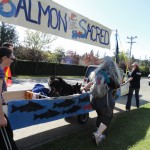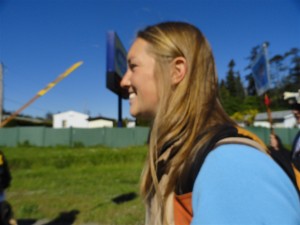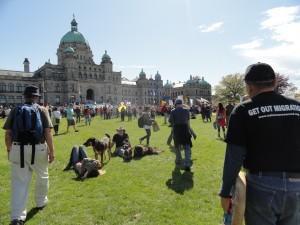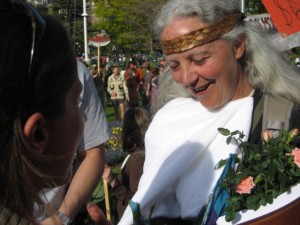Meeting Alexandra Morton
I got blisters on my fingers… and by fingers, I mean toes. My feet have never been so beat up in my entire life, but I can safely say that I sacrificed their happiness for a worthy cause. On Saturday, Libby and I walked from the marina in Sidney, British Columbia all the way to the parliament building in Victoria.
We walked approximately 18 miles with hundreds of other people as part of the Get Out Migration, a march to raise awareness about open-pen fish farms led by a woman named Alexandra Morton. She has lived in the Broughton Archipelago for more than twenty years, researching the Northern resident killer whale community and, more recently, the effects of open-pen fish farms on the wild salmon populations. After ten years of working to eradicate Norwegian fish farms from the area, Alexandra organized a three-week walk from the Northernmost to Southernmost tip of Vancouver Island to spread the word about their negative impact on local communities and ecosystems. During a trip to Vancouver Island a few years ago, my father bought me Alexandra’s book, Listening to Whales. I did not read it until last summer, when I was living at a remote research station off the cost of Maine. Her narrative about studying killer whales and her depiction of life as a field scientist was formative for me – since then, I have dreamed of meeting Alexandra Morton. When I heard that she was due to walk into Victoria while I was right across the water, I decided then and there that I had to walk with her. After much logistical planning, Libby and I pinned down a ride and set out for Sidney. Because we had to clear customs, we missed the start of the walk at 8 am, so the beginning of our journey was fairly rushed. Walking briskly through the Sidney suburbs without any sight of Alexandra and her entourage, Libby and I started to wonder if we’d be walking all the way to Victoria alone. Just as we were beginning to contemplate hitchhiking, a car pulled up beside us. “Hey, are you guys trying to catch up to the migration?â€Â A young woman named Megan, who turned out to be none other than Alex Morton’s assistant, opened her car door and ushered us inside. “I know migrators when I see them!†she said. Five minutes later, we came upon a train of cars, signaling the back of the migration pack. A woman with long, wispy white hair came into view, and my eyes widened. I was way too sweaty and frazzled to be thrust into the presence of Alexandra Morton already! Libby and I thanked Megan for saving us many uncomfortable miles of walking and started down the road, trailing Alex’s heels and wondering what to do next. Turns out my body is not too keen on the idea of walking 18 miles, so for the majority of our migration to Victoria, I was solely focused on putting one foot in front of the other. Because of this, I did not get the heart-to-heart with Alex I had imagined, but simply being in her presence and taking part in this massive culmination of her efforts was enough for me. After a long day of trekking down Highway 17, we entered Victoria, greeted by a huge group of supporters. The final 1 km walk to the parliament building was spectacular – thousands of people flooded the streets, marching to the beat of the First Nations’ drum and shouting to spectators.
through the Sidney suburbs without any sight of Alexandra and her entourage, Libby and I started to wonder if we’d be walking all the way to Victoria alone. Just as we were beginning to contemplate hitchhiking, a car pulled up beside us. “Hey, are you guys trying to catch up to the migration?â€Â A young woman named Megan, who turned out to be none other than Alex Morton’s assistant, opened her car door and ushered us inside. “I know migrators when I see them!†she said. Five minutes later, we came upon a train of cars, signaling the back of the migration pack. A woman with long, wispy white hair came into view, and my eyes widened. I was way too sweaty and frazzled to be thrust into the presence of Alexandra Morton already! Libby and I thanked Megan for saving us many uncomfortable miles of walking and started down the road, trailing Alex’s heels and wondering what to do next. Turns out my body is not too keen on the idea of walking 18 miles, so for the majority of our migration to Victoria, I was solely focused on putting one foot in front of the other. Because of this, I did not get the heart-to-heart with Alex I had imagined, but simply being in her presence and taking part in this massive culmination of her efforts was enough for me. After a long day of trekking down Highway 17, we entered Victoria, greeted by a huge group of supporters. The final 1 km walk to the parliament building was spectacular – thousands of people flooded the streets, marching to the beat of the First Nations’ drum and shouting to spectators.
It became evident to me that this is an issue that affects all of British Columbia’s citizens in different ways, but it is undeniable that the effects are uniformly negative. Libby and I collapsed on the parliament building lawn, ready to yank our shoes off and douse ourselves with cold water. The wide range of speakers at the final migration event, from First Nations chiefs to commercial fishermen, spoke of the cross-cultural concerns fish farms have raised. There were so many people crammed onto the lawn that we could not even see the stage, but it was enough just to be able to sit and listen. Alexandra was the last to speak; I had not lost all hope of meeting her, so I tried to keep one eye on her as she snaked back through the crowd amidst roaring applause. Libby pointed. “There she is!â€Â We knew this was the last chance we would get, so we pushed forward until we were standing right in front of her. As this was the end of Alex’s very long journey, I didn’t want to goad her into taking a photo with me or signing my book. I just wanted to say hello, so that’s what I did. Libby somehow managed to snap a candid photo of this moment (she’s amazing!), and I am so glad she did. Like I said, the blisters were well worth the pain.
To learn more about the Get Out Migration, click here






 Twitter
Twitter LinkedIn
LinkedIn Facebook
Facebook